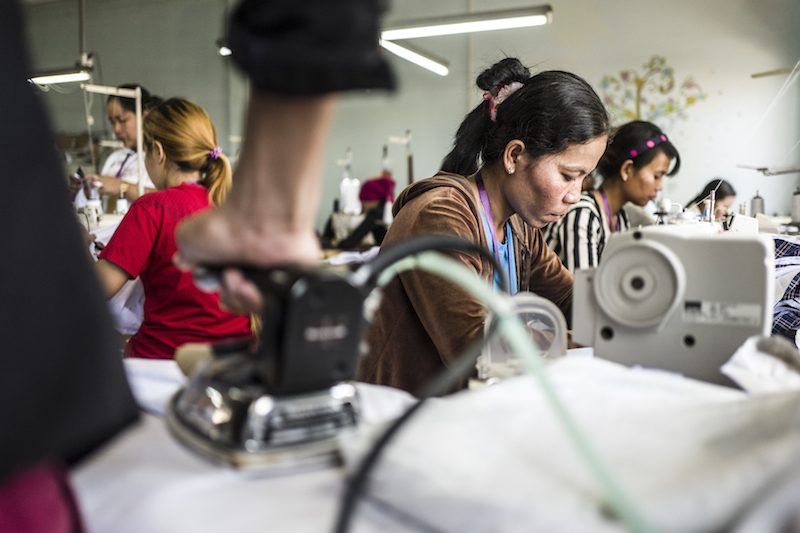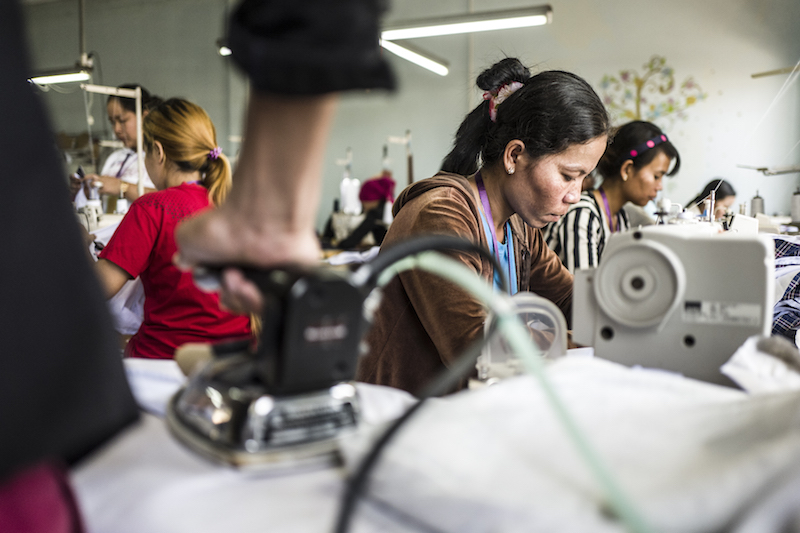Cambodia’s garment sector, although still expanding, will remain in a precarious position unless global brands significantly raise the prices they pay to manufacturers, or the sector sees a sharp increase in productivity, the International Labor Organization (ILO) warned in a report released yesterday.
With both possibilities improbable in the short term, factory owners are likely to struggle with continued increases in wages, the ILO said in its latest “Cambodian Garment and Footwear Sector Bulletin.”

“Investors require a certain return on their invested capital—if they do not obtain this, they may reconsider further investments in the Cambodian garment sector,” the report says.
“It’s likely that future increases in wages will therefore need to be accommodated by either increasing labour productivity, or the prices received for output, or both.”
The ILO’s warning comes as unions and employers prepare to sit down for another round of annual negotiations over the minimum wage for the more than 600,000 Cambodians employed in garment factories, with the outcome of those talks due to take effect in January.
The report notes that the minimum monthly wage, currently set at $140, has risen sharply in recent years, following years of stagnation, as the prices being paid by buyers—mostly brands in the U.S. and Europe—have stagnated, largely because of an increase in supply from countries including Vietnam and Bangladesh.
“The benefits of flat, and sometimes falling, garment prices has been enjoyed in part by consumers,” it says, adding that in both the U.S. and E.U., the cost of apparel rose by just 5.4 percent between 2006 and 2015.
“This is a very modest increase over the decade,” it says, going on to urge global brands to help reduce the financial burden on factories by paying higher prices.
“There is some scope for productivity gains, but the prospects of dramatic acceleration in productivity growth do not appear strong in the short term,” it says.
“Therefore, if significant wage increases are to be enjoyed by workers in Cambodia’s garment and footwear sector, price trends will be very important,” it continues, adding that prospects also look bleak on that front, due to slow economic growth in the U.S. and E.U.
Ken Loo, secretary-general of the Garment Manufacturers Association in Cambodia (GMAC), said the only way forward was to focus on increasing productivity, which he claimed was being held back by poor labor relations.
“The main impediment is illegal strikes really, and some labor unions obviously contribute to the culture within the factories: whether it’s a cooperative relationship or a destructive one,” he said. “They could have a positive influence on the workers’ relationship with management or a negative influence.”
Factories that are unable to ramp up productivity will simply have to shut down, Mr. Loo said.
“I think it’s clear that the factories that are surviving are the factories that have experienced some form of increase in their productivity,” he said. “And the factories that could not enact any kind of improvement in labor productivity are the ones that have closed or will be closing.”
GMAC says that 70 of its members have closed down this year, with only 35 new members opening, pointing to the disparity as a sign of struggling investors.
The ILO report, however, says the sector continued to show strong growth this year, with revenue increasing by 14.5 percent in the first quarter, worth about $1.8 billion.
Ath Thorn, head of the country’s largest independent union, said low productivity was due mainly to poor working conditions, and that improvements would depend on increased investment.
“This is the problem caused by companies that cause low productivity from workers. They force them to work long hours with low wages. That is why workers aren’t motivated to work hard for them.”
Mr. Thorn dismissed Mr. Loo’s claim that strikes were the main hindrance to scaling up productivity, noting that the Labor Ministry has reported a steep drop in strikes in recent years.
“They use this to run away from responsibility,” he said. “Why is he still talking about this?”
Mr. Thorn said better training and treatment of workers, stronger enforcement of labor laws, more modern machinery and longer contracts for experienced employees could all boost output.
“We have raised these issues many times with the companies,” he said. “But those owners only care about profits. They don’t care about these things.”




